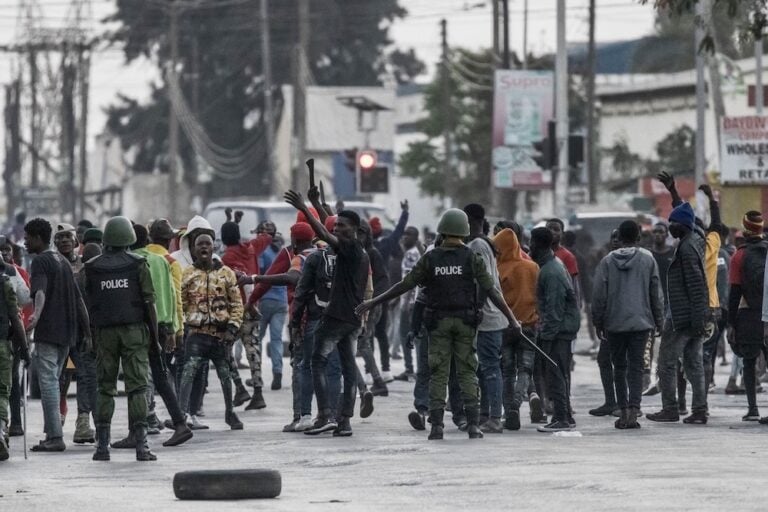(CPJ/IFEX) – CPJ is dismayed to learn that twelve journalists with the independent daily newspaper “The Post” have been summoned to appear in the High Court in Lusaka on 1 November 1999 on charges of espionage. **Updates IFEX alerts of 25 May, 30 April, 19 April, 1 April, 26 March, 25 March, 22 March, 19 […]
(CPJ/IFEX) – CPJ is dismayed to learn that twelve journalists with the
independent daily newspaper “The Post” have been summoned to appear in the
High Court in Lusaka on 1 November 1999 on charges of espionage.
**Updates IFEX alerts of 25 May, 30 April, 19 April, 1 April, 26 March, 25
March, 22 March, 19 March, 18 March, 17 March, 15 March, 12 March, 11 March
and 10 March 1999**
Defense Minister Chitalu Sampa ordered the crackdown on “The Post” and its
staff in retaliation for a story titled “Angola Worries Zambia Army, ZAF
[Air Force]” that appeared in the 9 March edition of the paper. The article
quoted senior, unnamed military officers to the effect that Zambia could not
withstand a military attack by Angola. “The Post”‘s editor-in-chief, Fred
M’membe, maintains that all the information in the article was freely
available in Jane’s Military Report on the Internet.
That same day, police arrested reporters Lubasi Mwangala Katundu, Kelvin
Shimo, and Joe Kaunda at their homes in Lusaka. Later that evening, police
began roving through the city in search of the newspaper’s editorial staff,
following an apparent order to arrest them all before dawn. By 10 March,
police had also arrested Amos Malupenga, Brighton Phiri and Goodson Machona.
On 10 March, police also besieged the editorial offices and the printing
press of “The Post”, cutting off power and water supplies and trapping a
number of staff inside. The police siege was called off on 12 March, shortly
after the six arrested journalists were released on a writ of habeus corpus.
On 17 March, police went to “The Post”‘s editorial offices to issue
summonses and formally charge the six journalists with espionage under the
State Security Act. In court the following day, each of the six was granted
bail of K 100,000 (US $43).
Three days later, police arrested two more “Post” reporters, Douglas Hapande
and MacPherson Muyumba, on similar espionage charges. They were picked up at
their homes, detained briefly, and then released. M’membe was arrested on
the same charge on 22 March, and immediately released on bail. Between 30
and 31 March, four more “Post” journalists – Dickson Jere, Mukalya Nampito,
Liseli Kayumba and Reuben Phiri – were also charged with espionage.
On 16 April, twelve of the thirteen journalists were committed to the High
Court for trial on espionage charges. (The thirteenth, Amos Malupenga, was
released after all charges against him were dropped without explanation).
Recommended Action
Send appeals to authorities:
which seem part of a systematic effort by your government to suppress
critical reporting
and are therefore incompatible with the democratic principles for which His
Excellency’s regime claims to stand
press freedom standards, including treaties to which Zambia is a signatory
journalists are released unconditionally
journalists’ right to report the news freely and without reprisal
Appeals To
His Excellency President Frederick Chiluba
State House
Independence Avenue
Lusaka, Zambia
Fax: +260 1 221 939
Please copy appeals to the source if possible.


